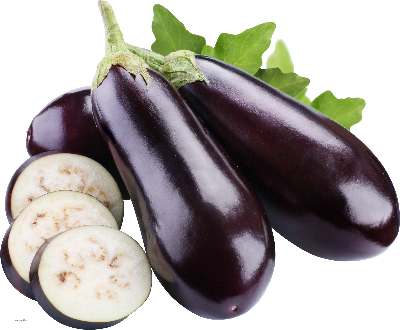Eggplant, Exotic in Taste, Appearance and History
TEXARKANA, Ark. –
The deep, rich purple of an American eggplant with its green-grey cap almost makes you think of royalty. It is one of the exotic vegetables in taste, appearance, and history. In fact, it was just 100 years ago that it was considered an ornamental plant in the U.S. The eggplant is a native of South and Eastern Asia and is a member of the nightshade family and similar to the potato, tomato, tomatillo and chayote. Although used as a vegetable; botanically, it is a fruit, a berry to be exact.
Around the fifteenth century it became popular in Mediterranean Europe and has been established in such classic dishes as ratatouille and moussaka. Today it can be baked, broiled, boiled, stuffed or used in a variety of casseroles in combination with other vegetables. Probably one of the most popular is eggplant casserole. Although used as a meat alternate in many dishes, it is not high in protein.
Eggplant is a good source of fiber and folate and contains potassium. It is low in calories, with only 30 to 35 for a one cup serving. Fiber helps control cholesterol and keeps you regular. Potassium helps maintain a healthy blood pressure, and folate may reduce the risk of heart disease. Eating foods with folate before pregnancy helps reduce your risk of neural tube defects.
Choose eggplants that feel heavy with smooth, tight, unblemished skin, fresh looking green stalks and deep purple skin. A medium size eggplant 3 to 4 inches in diameter is best and should not have brown or blue streaks, or a light color or yellowish skin. If it is shriveled or flabby, it is often bitter and poor flavor.
Eggplants are easily damaged and should be handled with care. Store as soon as possible in the vegetable compartment of your refrigerator, since high humidity is preferred for eggplant storage. If you are not going to store it in the vegetable compartment, it needs to be wrapped loosely in plastic wrap and used within one week of purchase.
Wash eggplant just before using. To remove dirt, wash vegetables thoroughly in cold water. Do not use soap, bleach or detergent as they can be absorbed by the eggplant. Drain and rinse several times with cold water.
To prepare, trim off the ends and peel before preparation, unless it is very young and tender. Cut the eggplant into thick slices, salt well and stand in a colander for around half an hour to allow the juices to drain away. Rinse thoroughly and dry with a kitchen towel. Eggplant goes well with tomatoes, garlic, onions, and cheese, as well as spices such as marjoram, oregano, allspice, chili powder, garlic or rosemary.
For more information come by the University of Arkansas System Division of Agriculture, Miller County Extension office in the courthouse, e-mail me at chaley@uada.edu or call 870-779-3609. You can also get great tips on facebook at UAEXMillerCountyFCS/CarlaHaleyHadley, and twitter at @MillerCountyFCS.
Eggplant Snack Sticks
1 medium eggplant
1/2 cup Italian bread crumbs*
1/4 cup Parmesan cheese
1 egg
Cooking spray
1 cup meatless spaghetti sauce, warmed
Cut eggplant lengthwise into slices, one half inch wide by 6 inches long. In a shallow bowl, combine the bread crumbs and cheese. In a separate bowl, lightly beat egg. Dip eggplant slices into egg and then roll in the bread crumb mixture. Arrange in a single layer on a baking sheet coated with non-stick spray. Spray slices with non-stick spray. Broil on high for 3 minutes. Remove pan from oven and turn slices over, spraying again with cooking spray. Return pan to oven and broil 2 minutes. Serve immediately with sauce.
*You may substitute 1/2 cup plain bread crumbs plus 1 teaspoon dry Italian seasoning and 1/2 teaspoon garlic powder. Yield: 8 servings Nutritional Analysis: 80 calories, 2.5 g fat, 1 g sat fat, 4 g protein, 30 mg cholesterol, 11 g carbohydrate, 340 mg sodium, 2 g fiber.
By Carla Haley-Hadley
County Extension Agent - FCS
The Cooperative Extension Service
U of A System Division of Agriculture
Media Contact: Carla Haley-Hadley
County Extension Agent - FCS
U of A Division of Agriculture
Cooperative Extension Service
400 Laurel Street, Suite 215 Texarkana AR 71854
(870) 779-3609
chaley@uada.edu
The Arkansas Cooperative Extension Service is an equal opportunity institution. If
you require a reasonable accommodation to participate or need materials in another
format, please contact your County Extension office (or other appropriate office)
as soon as possible. Dial 711 for Arkansas Relay.
Pursuant to 7 CFR § 15.3, the University of Arkansas System Division of Agriculture
offers all its Extension and Research programs and services (including employment)
without regard to race, color, sex, national origin, religion, age, disability, marital
or veteran status, genetic information, sexual preference, pregnancy or any other
legally protected status, and is an equal opportunity institution.
